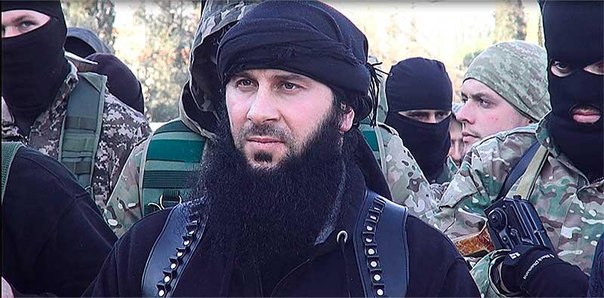
Is Moscow Set to Target Russians Fighting Against Assad in Syria?
Publication: Eurasia Daily Monitor Volume: 12 Issue: 177
By:

Russia’s involvement in the Syrian conflict on behalf of Syrian leader Bashar al-Assad may take the war in the Middle East to a new level. The main concern of North Caucasians will be whether Moscow’s involvement in the conflict results in it sending military personnel from Russia’s Muslim regions to the Middle East.
If the Russian government dispatches pro-Moscow Chechen forces to Syria, they will prioritize killing the Chechens who are already on the ground fighting against al-Assad’s regime. First of all, the pro-Moscow Chechens will target the anti-Assad Chechen groups located in the areas of Latakia, Idlib and Aleppo. The largest of these anti-Assad groups is Jaish al-Muhajireen wal-Ansar (Army of the Emigrants and Partisans), which unites mostly citizens of the former Soviet republics (Centrasia.ru, September 24).
Last summer, a conspiracy group within Jaish al-Muhajireen wal-Ansar removed the Chechen leader of the group, Amir Salahudin Shishani (Feizulla Margoshvili) (see EDM, July 10). A Saudi national, Mutgasim Billah al-Madani, led the coup in the group. Even though al-Madani subsequently appointed a Dagestani who had supported the coup as the group’s military amir, it is unlikely the group will remain intact, since a majority of its Chechens have left to fight under amir Salahudin Shishani. The outflow of the North Caucasians and of other Russian speakers from Jaish al-Muhajireen wal-Ansar will increase as the new group established by Salahudin Shishani gains traction. The new leadership of Jaish al-Muhajireen wal-Ansar broke the main principle of the group—to avoid affiliation with al-Qaeda or the Islamic State. The new leadership of Jaish al-Muhajireen wal-Ansar has been looking for ways to bolster its credentials as it loses its North Caucasian members. The group has officially pledged allegiance to the leadership of the Syrian branch of al-Qaeda, Jabhat al-Nusra (Warsonline.info, September 24).
Meanwhile, the dismissed amir, Salahudin Shishani, established a new group of militants in Syria, Imarat Kavkaz (Caucasus Emirate). The militant leader recently made a brief statement, saying that he left Jaish al-Muhajireen wal-Ansar three months ago. According to Shishani, Jaish al-Muhajireen wal-Ansar was founded primarily by militants from the Caucasus Emirate in the North Caucasus. He emphasized that his new group would not become part of any other militant unit operating in the area (Sendvid.com, September 26). Shishani has implemented a clever marketing strategy for his group by giving it the name “Caucasus Emirate.” This will help it attract Russian-speaking militants who do not want to be under the command of Arab fighters.
Russian security services are likely to target Amir Muslim (Muslim Margoshvili), whose group still operates independently. Muslim’s group Jund al-Sham (Soldiers of Syria) suffered losses after many of its Chechen members left it for the group of Umar Shishani (Tarkhan Batirashvili) after the so-called Islamic State was proclaimed. Still, Amir Muslim’s group remains a combat-ready unit that operates in the area (YouTube, July 30). Apart from Amir Muslim, other Chechen commanders are also part of his group, such as Abu Turab, Abu Bakr, Abudullah Shishani and many others. The group is located in the area of the city of Jisr al-Shughur, in the province of Idlib, which borders Latakia.
Amir Abdul-Khakim Shishani (Rustan Azhiev) is of no less interest to the Russian security services. He commands a group called Ajnad al-Kavkaz, which is part of Ansar al-Sham (Partisans of the Levant), which in turn is part of a larger organization, the Jaysh al-Fateh (Conquering Army) coalition. Ansar al-Sham, prior to its membership in Jaysh al-Fateh, was part of al-Jabhat al-Islamiyya (Islamic Front), and prior to that, it was part of al-Jabhat al-Islamiyya al-Suriyya (Syrian Islamic Front). Amir Abdul-Khakim Shishani is one of the few militants with substantial experience fighting in the wars in Chechnya. This is why he is so valued by the local militants. Abdul-Khakim Shishani’s group operates in both Latakia and Idlib, which puts it on the forefront of the battle if the Russian security services stage an attack.
One of the primary military amirs of the so-called Islamic State, Umar Shishani, is the most probable target of the Russian security services. Russian media has declared him dead on at least eleven occasions over the past three years.
Apart from these commanders, there are others who are less known but also quite active in the fight against Bashar al-Assad’s regime. For example, Amir Musa (Ansar Sham—Levant Partisans), Amir Al Bara Shishani, Amir Muhannad al-Shishani are among others fighting in the Idlib area. There are also separate groups of militants, such as Dirr Al Islam, Tarkhan and others that are mostly made up of Chechens. Normally, these groups do not provide membership figures, so their size can only be guessed from auxiliary information (Warsonline.info, April 15). Despite the lack of clarity about the figures, it can be said that several thousand militants from the post-Soviet space may be fighting in Syria in a variety of groups. The vast majority, probably over 3,000, are estimated to be Chechens.
It is unclear why Russia sat back for so long and allowed the militants in Syria to consolidate. Now, they pose a danger not only to the Russian North Caucasus, but also to areas in Central Asia adjacent to Russia. Citizens of Central Asian states have also started to resettle in Syria in large numbers. Thus, Russia will try not only to help President al-Assad, but also to kill as many of its own citizens—and citizens from states neighboring Russia—who are fighting in the Middle East as possible, before they return to their homelands.




